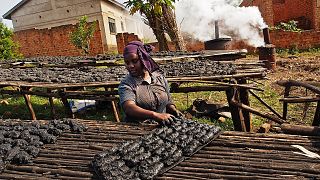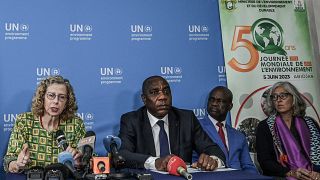Uganda
Scientists at the National Agriculture Research Institute in Uganda are hoping to save the environment from plastic waste with their new eco-plastic potting bags.
Traditionally, farmers use plastic wrappings to pot seedlings.
The plastic wrappers are thrown away at the planting stage which is a danger to the environment.
Now Ugandan scientists have made a biodegradable type which goes in the soil together with the seedlings.
The bio-plastic rots in the soil and adds nutrients back into the farm.
"It is coming from our own agriculture waste, that means, banana, cassava, cereal can be used, unlike the traditional one where we have to use oil-based plastic material or what we call the fossil-based plastics," Dr. Ephraim Nuwamanya at the Heads Biochemistry Unit, National Agriculture Research Institute.Heads Biochemistry Unit, National Agriculture Research Institute
Harnessing the potential of agriculture waste
Plastic waste contributes to 60% of pollution to the environment in Uganda. Most of this is washed into drainage channels and into lake Victoria which millions depend on.
The government has on several occasions put a ban on single use plastic but it has not been enforced.
The researchers are now making use of readily available farm waste to make bio-plastic bags.
This is how the paste is made: Once farm waste is dried, it’s shredded into powder form and mixed with other products including starch to form a paste. The paste is what is dried and rolled out into this sheet of biodegradable plastic for use as seedling pots.
Field trials are going on with seedling farmers in the Mt Elgon region in Eastern Uganda.
But the bags can easily be attacked by insects.
The researchers have developed a plant-based repellent to stop paste attacks.
"We are convinced that the moment you apply it on the bio-plastic it will be effective and repel the insects," Biochemistry master's student Profilio Tukundane explains.
"At the same time it also has mortality effects, it kills some of them, that is in case the concentration is high," the Makerere University student adds.
In Uganda up to 1.4million tonnes of Agriculture waste is produced annually and most of it is under utilized....
The researchers say farmers will benefit enormously from this project by selling waste for processing.
Uganda is working with the University of Bangor in the UK to roll out mass production in about a year.













11:05
Africa's hight cost of climate change [Business Africa]
01:16
Kenya investigates alleged abduction in Nairobi of Uganda opposition figure
01:16
Ugandan opposition politician kidnapped and jailed, his wife says
01:26
Zimbabwe’s Climate-Smart Agriculture: Empowering Farmers through Resilience and Innovation
01:59
Botswana’s young farmers hope new government will boost agriculture sector
02:19
Thousands of refugees in Uganda struggle to get by, amid cuts in humanitarian aid